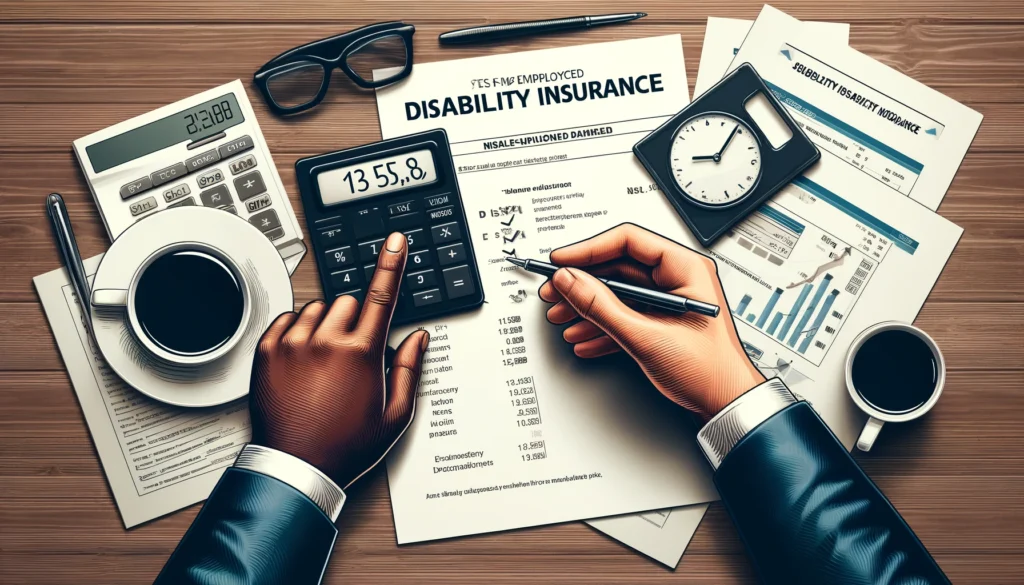
Disability Insurance for Self Employed Professionals: A Crucial Safety Net
Disability insurance for self employed professionals, The self-employed life comes with a unique set of risks and rewards. One often-overlooked risk is the potential for a disabling injury or illness that prevents you from working and earning income. Disability insurance acts as a vital financial safeguard in these scenarios, but navigating the options as a self-employed individual requires careful consideration.
Why Disability Insurance is Essential for the Self-Employed
- Income Replacement: Unlike employees who may have access to group disability plans, Disability insurance for self employed professionals individuals lack this safety net. Disability insurance replaces a portion of your lost income, allowing you to cover living expenses, business costs, and maintain your financial stability.
- No Paid Sick Leave: Disability insurance for self employed professionals don’t have the luxury of paid sick leave. Disability insurance steps in to provide income when you can’t work due to a covered condition.
- Business Continuity: A disability can disrupt your business operations. Disability insurance helps cover overhead expenses like rent, utilities, and employee salaries, keeping your business afloat during your recovery.
Types of Disability Insurance
| Type | Description | Benefits | Considerations |
| Short-Term Disability | Replaces income for a shorter period, typically 3 to 6 months. | Less expensive, quicker approval process. | May not be sufficient for long-term conditions. |
| Long-Term Disability | Covers longer periods, potentially up to retirement age. | Provides more comprehensive protection, often includes partial Disability insurance for self employed professionals benefits. | More expensive, more stringent underwriting. |
| Own-Occupation | Pays benefits if you cannot perform your specific occupation. | Ideal for highly specialized professionals. | Typically more expensive. |
| Any-Occupation | Pays benefits only if you cannot work in any occupation you are reasonably qualified for. | More affordable option. | May not be suitable if your skills are specialized. |
| Supplemental Policies | Can be added to existing coverage to enhance benefits. | May cover specific business expenses, provide additional income, or offer rehabilitation benefits. | Can tailor coverage to specific needs. |
| Business Overhead Expense (BOE) | Designed to cover business expenses if the owner becomes disabled. | Helps maintain the business’s financial stability during the owner’s disability. | Typically not a direct income replacement. |
| Group Disability | Offered through professional associations or organizations. | May be more affordable than individual policies Disability insurance for self employed professionals. | Coverage options may be limited, may not be tailored to individual needs. |
Key Policy Features
- Elimination Period: The waiting period before benefits begin after a disability occurs.
- Benefit Period: The length of time benefits will be paid (e.g., 2 years, 5 years, or up to retirement age).
- Benefit Amount: The percentage of your pre-disability income that the policy will replace.
- Riders: Optional add-ons that enhance coverage (e.g., cost-of-living adjustments, future increase options, return of premium).
Top Insurance Websites for Self-Employed Disability Insurance
- Guardian Life: Offers a range of disability insurance options specifically tailored for Disability insurance for self employed professionals.
- Northwestern Mutual: Provides comprehensive information and resources on disability insurance for the Disability insurance for self employed professionals.
- Principal: Offers various disability insurance products and tools to help Disability insurance for self employed professionals choose the right coverage.
Comparing Different Disability Insurance Options
| Insurer | Key Features | Pros | Cons |
| Guardian Life | Strong focus on self-employed professionals, customizable options | Range of riders, specialized expertise | May be less competitive on price for some individuals |
| Northwestern Mutual | Comprehensive financial planning approach | Strong reputation, personalized service | May require working with a financial advisor |
| Principal | Wide range of insurance products | Online tools and resources, diverse coverage options | Customer service may vary |
Additional Tips
- Income Documentation: As a Disability insurance for self employed professionals, be prepared to provide detailed income documentation to insurers.
- Medical Underwriting: Insurers will evaluate your medical history. Pre-existing conditions may affect your eligibility or premium.
- Shop Around: Compare quotes from multiple insurers to find the best coverage and rates for your needs.
- Consult a Financial Advisor: A financial advisor can help you understand your options and make informed decisions.

Latest Information and Trends
COVID-19 Impact: The covid-19 outbreak highlighted the need for disability insurance for two major groups, of which Disability insurance for self employed professionals are one. However, some of the insurers have now extended their policies to come with coverages that address some of the pandemic factors.
Mental Health Coverage: Mental health coverage has become an essential aspect with insurance policies especially to people with disability.
Technology Integration: Some examples that are in various stages are the use of Biometrics where insurance consumers apply online or at the insurance underwriters’ offices for policies, and use of smart devices where policyholders report claims incident and share customer data.
Disability insurance for self employed professionals is protecting oneself against the risk of losing income due to an illness or an injury and keeping the business afloat. After analysing the range of policies offered and the possibilities of coverage, you can understand which type of policy is more suitable for you, or even more suitable with your level of risk.
Navigating the Application Process
An important aspect that one should know is that making an application for disability insurance when one is a independent working professional differs even from applying for a traditional employee. Here’s what you can expect:Here’s what you can expect:
Income Verification: Insurers might demand similar information that include tax returns, statements of profits or losses, and form 1099 records of income details taken over time. Disability insurance for self employed professionals.
Medical Underwriting: First, you will be subjected to a medical check and you will also be asked to present your health history. Conditions before the beginning of the policy can impact on your standing or the price of the policy. The best policy when dealing with an insurer is to declare any health condition.
Policy Customization: It is advisable to get in touch with your insurance agent and find out the necessary changes to his policy that should reflect his needs and Income level. Think to add extra riders that may provide more benefits like one that inflation or future increase options.

Claiming Disability Benefits
If you become disabled, the claims process typically involves:If you become disabled, the claims process typically involves:
Notification: Report the disability to your insurer immediately and enclose copies of any relevant medical report. Disability insurance for self employed professionals.
Claims Investigation: The insurer will then examine your health record and may seek more details from your doctorl
Benefit Payment: Where you have made a valid claim, you only start to be paid the Benefits after the elimination period.
Disability insurance for self employed professionals must find ways to fund their own disability insurance costs.
The cost of disability insurance varies depending on several factors, including:The cost of disability insurance varies depending on several factors, including:
Age: New applicants are generally younger than the average applicant and thus their premiums tend to be cheaper.
Occupation: Noteworthy is the fact that higher premiums can be proclaimed in riskier occupations.
Health: The nature of your health history will determine your premiums; thus, affecting the overall rates of your insurance plan.
Coverage Amount: This mean that the closer the benefit amount to the actual financial situation rises, the more expensive the premium is.
Benefit Period: When it comes to the benefit rate, percentage, or limit, it is entitled longer, the premium higher it will be.
Elimination Period: This is because there are more chances for claims to occur with the short span between the elimination periods.
Tax Implications
Disability insurance although is an extremely important product for Disability insurance for self employed professionals, it is noteworthy to note that premiums for disability insurance are normally not tax deductible. Nevertheless, the amount you stand to be paid may be free of taxes where the premiums were paid from your taxed earnings. It is suggested that an individual should seek the services from the tax consultant in order to understand the basic implications of tax on the given situation.

Alternatives to Disability Insurance
While disability insurance is the most comprehensive protection, other options exist:While disability insurance is the most comprehensive protection, other options exist:
Emergency Savings: Requirement for emergency funds that could cater for the lifestyle of the individual for several months in the event of a Disability insurance for self employed professionals.
Passive Income Streams: Build assets that you are able to create income from, when you do not have the option of working any longer.
Critical Illness Insurance: The following is a brief overview of this type of insurance: This insurance covers a lump sum when one is diagnosed with any critical illness as defined in the policy and will assist to cater for medical expenses and loss of income.
The Bottom Line
Disability insurance is an important part of planning and protecting the monetized Disability insurance for self employed professionals for independent professionals. It allows for income replacement if you are unable to work due to an illness, injury, or disability; it helps pay for bills that may have been incurred by your business; it gives the assurance that you and/or your business are shielded in case of an unfortunate event happening in the future. This type of insurance is very important, especially because a disability could be the only thing that helps you survive financially.
FAQs
As a freelancer, can I get disability insurance even if I don’t have an employer-sponsored plan?
Absolutely! Disable insurance is very important particularly so you can go solo since there is no employer subsidized coverage as a freelance worker. A large number of insurers have developed insurance products that are intended for freelancers, independent contractors, and owners of small enterprises.
What’s the difference between “own-occupation” and “any-occupation” disability insurance?
Disability insurance called “own-occupation” is the one that pays the benefits only if the insured person is unable to perform the duties of his or her job because of a disability. This is why it is also known as “any occupation” policies; they only pay benefits if you are unable to perform any work for which one can reasonably qualify for. Own-occupation policies cost more but provide coverage for more specific jobs and usually are better for individuals with complex work.
How much disability insurance do I need as a self-employed professional?
Determining the extent of coverage that will be best suitable for your case will therefore be possible only after considering your individual circumstances. Invoice your monthly expenditures as well as the other miscellaneous expenses which you incur on personal and business levels, the debts that you owe and the way you intend to live in the future. Typically, the majority of the policies pay only 60 percent of your pre-disability salary, notwithstanding, additional options are often available to increase coverage.
Are disability insurance premiums tax-deductible for the self-employed?
Specifically, indemnity disability insurance policy premiums are not deductions on Personal expenses for the Disability insurance for self employed professionals. However, the benefits that you receive upon disablement could be received tax-free if you used after-tax money to pay for the premiums. Please seek advice from a tax consultant on how this applies to your circumstances or individual tax issue.
Will my pre-existing medical conditions make it impossible to get disability insurance?
By law, they cannot deny you coverage or charge more for pre-existing conditions but there will be exclusion or Disability insurance for self employed professionals. Product and underwriting classes: Insurer will also evaluate your medical records when underwriting the policy. Notify your insurance company about any pre-existing conditions that may exist, because failure to do so at this time may result in a denial of coverage when necessary in the future.